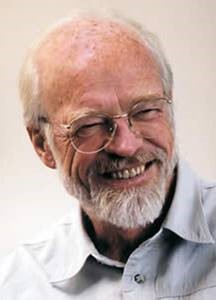By Eugene H. Peterson
“John the Baptizer appeared in the wild, preaching a baptism of life-change that leads to forgiveness of sins.” Mark 1:4 (MSG)
There is an interesting history of the word repentance. The word in Hebrew means originally to take a deep breath and sigh. A deep feeling of sorrow, of remorse. Repentance at the root, at the very beginning, seems to have the idea that you realize that you have done something wrong and you feel badly about it. And you feel it deeply; it gets down deep inside of you, and you groan or sigh or you breathe deeply. All of us know how that works. We know that part of repentance. We know the part that has to do with our feelings.
[Read The Message: The Bible in Contemporary Language by Eugene H. Peterson on Bible Gateway]
The interesting thing is that use of the word didn’t last long in the Bible. Very quickly the writers began to substitute another word for the same action, and this other word meant return or turn around and go. Not a word of feeling at all, but a word of action. Under the influence of the prophets, repentance became not something you felt but something you did. And it’s essential you get that through your heads if you are going to understand what the Bible means about repentance. You don’t repent by taking a deep breath and then feel better. You only repent when you turn around and go back or toward God. It doesn’t make any difference how you feel. You can have the feeling, or you don’t have to have the feeling. What’s essential is that you do something. The call to repentance is not a call to feel the remorse of your sins. It’s a call to turn around so that God can do something about them.
[Browse the many books and Bibles by Eugene Peterson]
John the Baptist was called the forerunner of our Lord. He prepared the way. He got people ready to listen to and respond to Jesus Christ. And the way he did it was to preach repentance. That’s about all he talked about. That’s all we know he talked about. A baptism of repentance. Now remember he’s not calling the people together and playing on their emotions by saying, “What terrible people you’ve been. Don’t you feel badly for the way you’ve lived? Shed a few tears.” He didn’t do that. He used the word which by John’s time in history had an action meaning. He was saying, “Turn around. Start looking in a different direction. Start going a different direction. God’s coming to you. Get ready for it.”
[Read Bible Gateway Blog post, Eugene H. Peterson (1932 – 2018)]
There is an old story around the Ozarks about a fiddler who always played just one note on his fiddle, and someone came up to him one day and said, “Zeke, all these other fiddlers play a lot of different notes. How come you just play one note?” He replied, “Well, all those other guys are looking for the right note. I’ve found it.” And that’s the impression you get with John the Baptist. He had one note he played, and he kept playing it and playing it and playing it.
[Read Bible Gateway Blog post, Exploring the Psalms With Bono and Eugene Peterson]
A lot of other people were saying a lot of other things about the coming of the Messiah. Some of them were a lot more interesting, but John just kept plunking away, “Repent, repent, repent.” Because, you see, John knew that there was really not a whole lot we can do about our salvation. God has done all that needs to be done. God has prepared a life for us and a salvation for us, which is fantastic. It’s complex. It’s intricate. It’s wonderful. And there’s not much we can contribute. In fact, you might say that there is not anything we can contribute. But there is something we have to do. We have to turn around.
We have to go that way. We have to open ourselves up to that direction. And so, the monotony of the word repent, the singleness of John’s message, didn’t get complicated with us. He didn’t get fancy, and he didn’t have complicated doctrines he tried to get us to understand. He just wanted to get us to turn around so that we are there for God to do something with us in Jesus Christ.
The above article is excerpted from A Month of Sundays: Thirty-One Days of Wrestling with Matthew, Mark, Luke, and John by Eugene H. Peterson. Copyright © 2019 by Eugene H. Peterson. Published by WaterBrook, an imprint of Random House, a division of Penguin Random House LLC, on November 5, 2019. Used by permission of WaterBrook. waterbrookmultnomah.com. Pages 49-53. All rights reserved.
BIO: Eugene H. Peterson, translator of The Message: The Bible in Contemporary Language, is the beloved author of more than 30 books, including A Long Obedience in the Same Direction: Discipleship in an Instant Society, Run with the Horses: The Quest for Life at Its Best, Christ Plays in Ten Thousand Places, and Tell It Slant. He earned his master’s degree in Semitic languages from Johns Hopkins University. Peterson was the founding pastor of Christ Our King Presbyterian Church in Bel Air, Maryland, where he and his wife, Jan, served for 29 years. Peterson held the title of professor emeritus of spiritual theology at Regent College, Vancouver, British Columbia, from 1998 until his death in 2018.
Study the Bible with confidence and convenience by becoming a member of Bible Gateway Plus. Get biblically wise and spiritually fit. Try it right now!
The post Repent is a Word of Action appeared first on Bible Gateway Blog.













